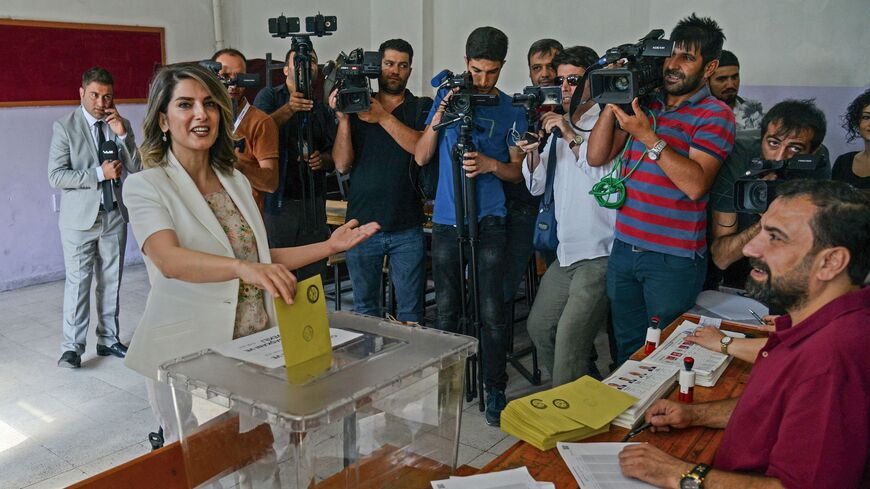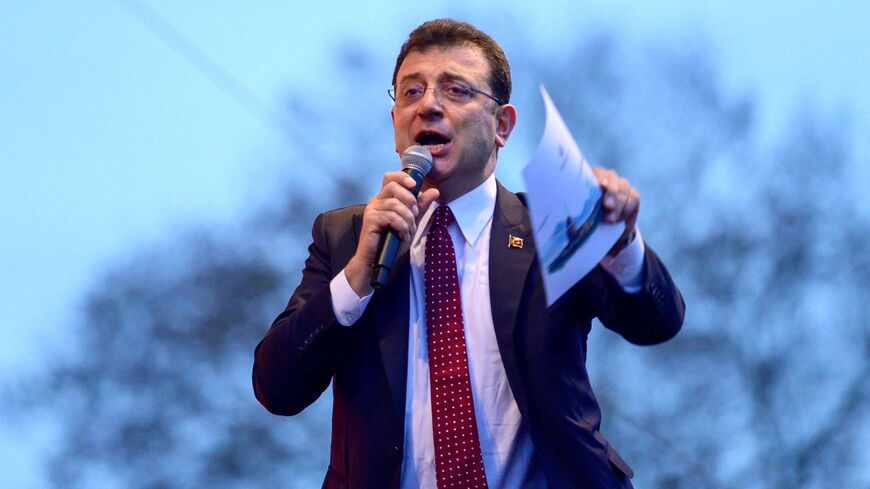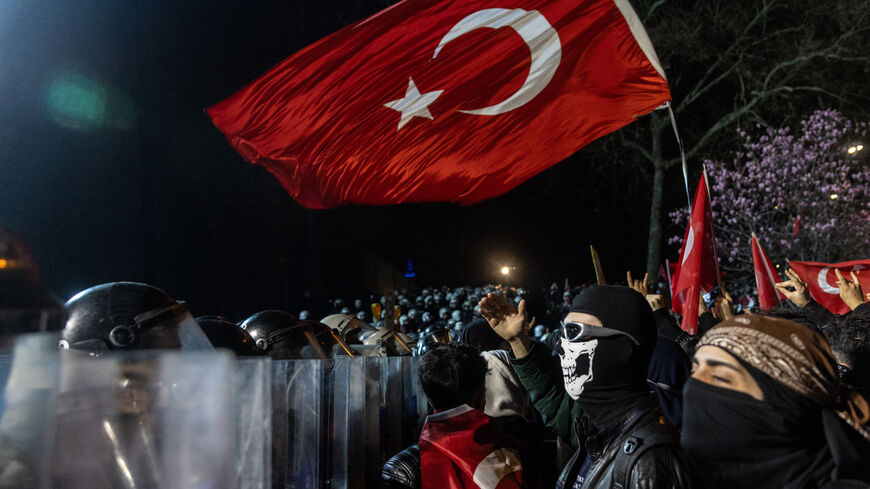Will Erdogan’s fate be decided at Turkey's local polls?
An opposition victory in March 31 municipal elections, including in Istanbul, could shake up Turkey's political scene in unpredictable ways, perhaps even descent into full-blown authoritarianism.

On March 31, Turkey's 61,441,882 registered voters will (or will not) cast their ballots to elect mayors in 81 provinces and numerous other districts and subdistricts in local elections widely billed as the opposition’s last chance to halt Turkey’s descent into full-blown authoritarianism under President Recep Tayyip Erdogan.
Recent polls indicate that the main opposition Republican People’s Party (CHP) will succeed in retaining control of the country’s capital, Ankara, by a wide margin, and its third largest city, Izmir, albeit narrowly. If surveys prove to be correct, the CHP is set to snatch Bursa, Turkey’s fourth largest city and home to its vast textile industry, from Erdogan’s ruling Justice and Development (AKP) party as well.
Most critically, however, CHP incumbent mayor Ekrem Imamoglu appears poised to prevail once again in Istanbul, which accounts for 18% of Turkey’s 86 million citizens. Pollsters have him ranging between 1 and 9 percentage points ahead of his lackluster AKP rival, Murat Kurum.
In truth, the Istanbul contest is really between Imamoglu and Erdogan, who insists that Turkey’s very future is at stake. More likely, many of Erdogan's opponents would probably claim, it is his own future that hangs in the balance.
Should Imamoglu win, his march to the presidency in the next elections, four years from now, will be unstoppable they say. Others caution that four years is a long time.
Imamoglu, a little-known former contractor who like Erdogan hails from the Black Sea region, made his mark in the March 2019 local elections when he beat the AKP, not once but for a second time as well. A shocked Erdogan was outraged at losing his native city, which had propelled him to power as its first Islamist mayor in 1994. Citing thinly evidenced claims of irregularities, Erdogan ordered a revote in June. Imamoglu won again, this time with a thumping majority.
Several factors weigh in Imamoglu's favor despite an exceedingly unlevel playing field, including AKP’s stranglehold over the mainstream media.
Economic woes
Foremost is the dire state of the Turkish economy, which is poised to affect the AKP’s ratings across the country. Runaway inflation has left even the most fervent AKP loyalists disgruntled, with a growing number defecting to Erdogan’s former ally, the Yeniden Refah Partisi (YRP), led by Fatih Erbakan, the son of the late Necmettin Erbakan, Erdogan’s mentor and Turkey’s first Islamist prime minister.
“Many people around me say they are going to vote for YRP because of their financial difficulties and because of YRP's strong pro-Palestinian stance,” said Osman Atalay, a veteran official at IHH, Turkey’s largest Islamic relief organization. Erbakan junior has taken special aim at the government's reluctance to sever trade ties with the Jewish state even as it lambasts its actions in Gaza.
In addition, Atalay told Al-Monitor, Kurum has proved to be a weak candidate, and Erdogan’s efforts to cast himself as the real candidate appear to have failed, as have his heartstring-pulling hints that this may be his last run. Erdogan has admitted as much.
At a recent rally in Istanbul, the 70-year-old, who has led Turkey uninterrupted for the past two decades, complained about the size of the crowd. “We are accustomed to 1.5 million people in this arena. Today there are only 650,000,” he groused to an audience that had already begun thinning before he finished his speech.
Another big factor is the Kurdish vote. In 2019, Istanbul’s Kurds, who account for roughly 11% of voters, backed Imamoglu when the largest pro-Kurdish bloc — since rechristened DEM to evade a political ban — decided not to field candidates in several provinces and districts outside its traditional strongholds in the southeast. This time, DEM decided to run its own mayoral contenders, sparking speculation of a “secret deal” with Erdogan, but the conspiracy theories swiftly crumbled as the CHP and DEM struck alliances in 22 districts in Istanbul, where an estimated 80% of the city’s ethnic Kurds are thought to reside.
Roj Girasun, co-founder of Rawest, a research and polling outfit based in Diyarbakir, the Kurds’ unofficial capital, reckons that some 40% of Kurdish voters who voted for Imamoglu in the last elections will do so again. This is in part because of the legitimacy the alliances confer on him.
“They feel more comfortable voting for Imamoglu because it doesn’t feel like they are betraying DEM,” Girasun told Al-Monitor. Moreover, DEM’s own mayoral candidates in the city are leading rather sleepy campaigns, some say deliberately so to favor Imamoglu.
Unsurprisingly, the CHP-DEM arrangements prompted Erdogan to renew his claim of the CHP being in cahoots with “terrorists,” namely, the Kurdistan Workers’ Party (PKK), which is waging an armed campaign against the Turkish state.
Calls from the Iraqi Kurdistan–based veteran PKK commander Murat Karayilan not to side with “tyrants and thieves” were widely interpreted as something of an endorsement for Imamoglu.
While no one has dared to conduct a formal survey, it is widely assumed that a fair chunk of DEM’s base is sympathetic to the PKK. This has spurred the AKP government, much like its military-backed predecessors, to seek to criminalize the Kurdish political movement, prosecuting and jailing tens of thousands of party officials and activists on spurious terror charges. Never mind that nine years ago the AKP was holding peace talks with the PKK’s imprisoned leader, Abdullah Ocalan. The resulting erosion in Turkish nationalist votes was one of the reasons Erdogan ditched those talks.
Similar considerations have discouraged Imamoglu from overtly courting Kurdish votes. Yet, one of his campaign songs was in the main Kurdish dialect, Kurmanji, though its lyrics were decidedly tame.
It may be a measure of Imamoglu’s popularity transcending party lines that prosecutors have shied away from a final ruling on the jail sentence and political ban they slapped on the 52-year-old in 2022 for allegedly insulting electoral officials who ruled in favor of the Istanbul revote. A final decision was pushed back to April, that is, until after the March 31 polls.
A Pyrrhic victory?
It may also be that Erdogan has made other calculations. It is no secret that he wields enormous influence over the courts. As such, claims that an Imamoglu victory will spell the beginning of the strongman’s end may well prove naïve and premature. Without question, an electoral upset would make it harder for Erdogan to push through constitutional changes that would allow him to run for a third term in 2028.
The margin with which Ankara’s formally CHP, but ideologically Turkish nationalist mayor, Mansur Yavas, wins will be a bellwether. If it is significant, it will not only shake up the political scene in unpredictable ways, argues Girasun, it will also make it that much less likely that Erdogan will turn to the Kurds for their support. If anything, he will double down on his current nationalist bent. Worse, any further weakening of his electoral fortunes may well lead him to tighten the screws on the opposition, above all on Imamoglu.
CHP insiders meanwhile air worry that internal strife and factionalism may affect cadres' vigilance at ballot stations that helped prevent potential fraud in 2019.
An opposition victory could spell an accelerated descent into further authoritarianism, not the other way round.







